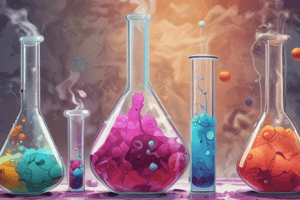Podcast
Questions and Answers
Las reacciones de síntesis siempre involucran la formación de dos productos.
Las reacciones de síntesis siempre involucran la formación de dos productos.
False (B)
Las reacciones de descomposición siempre liberan energía.
Las reacciones de descomposición siempre liberan energía.
False (B)
Todas las reacciones de combustión producen dióxido de carbono y agua.
Todas las reacciones de combustión producen dióxido de carbono y agua.
True (A)
En una reacción de desplazamiento simple, un compuesto se descompone en dos elementos.
En una reacción de desplazamiento simple, un compuesto se descompone en dos elementos.
Las reacciones de síntesis siempre son exotérmicas.
Las reacciones de síntesis siempre son exotérmicas.
Las reacciones de descomposición siempre producen un solo producto.
Las reacciones de descomposición siempre producen un solo producto.
Todas las reacciones de combustión involucran oxígeno como reactante.
Todas las reacciones de combustión involucran oxígeno como reactante.
En una reacción de desplazamiento simple, un elemento se descompone en dos productos.
En una reacción de desplazamiento simple, un elemento se descompone en dos productos.
Flashcards are hidden until you start studying
Study Notes
Chemical Reactions
Synthesis Reactions
- A reaction where two or more substances combine to form a new compound
- General equation: A + B → AB
- Example: 2H2 + O2 → 2H2O (hydrogen and oxygen combine to form water)
- Characteristics:
- Two reactants form one product
- Often releases energy (exothermic)
Decomposition Reactions
- A reaction where a single compound breaks down into two or more simpler substances
- General equation: AB → A + B
- Example: 2H2O → 2H2 + O2 (water breaks down into hydrogen and oxygen)
- Characteristics:
- One reactant forms two or more products
- Often absorbs energy (endothermic)
Combustion Reactions
- A reaction where a substance reacts with oxygen to produce heat and light
- General equation: Fuel + O2 → Products (CO2, H2O, etc.)
- Example: 2CH4 + 3O2 → 2CO2 + 3H2O (methane burns in oxygen to produce carbon dioxide and water)
- Characteristics:
- Involves oxygen as a reactant
- Releases heat and light energy
- Often produces CO2 and H2O as products
Single Displacement Reactions
- A reaction where one element displaces another element from a compound
- General equation: A + BC → AC + B
- Example: Zn + CuSO4 → ZnSO4 + Cu (zinc displaces copper from copper sulfate)
- Characteristics:
- One element replaces another element in a compound
- Often forms a new compound and a pure element as products
Studying That Suits You
Use AI to generate personalized quizzes and flashcards to suit your learning preferences.




